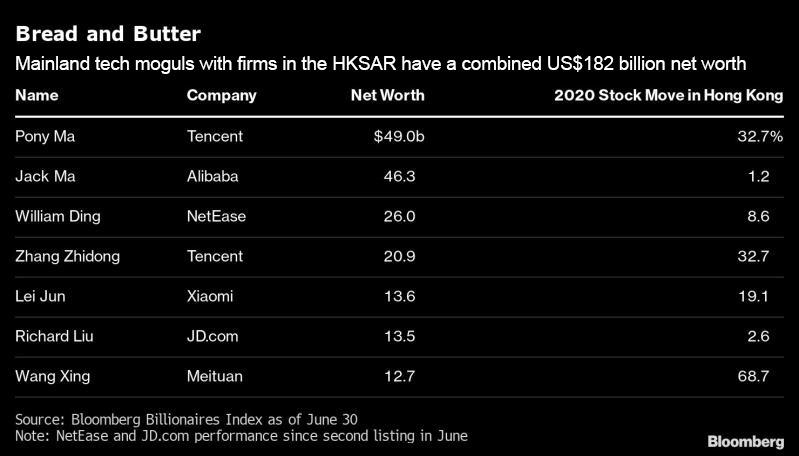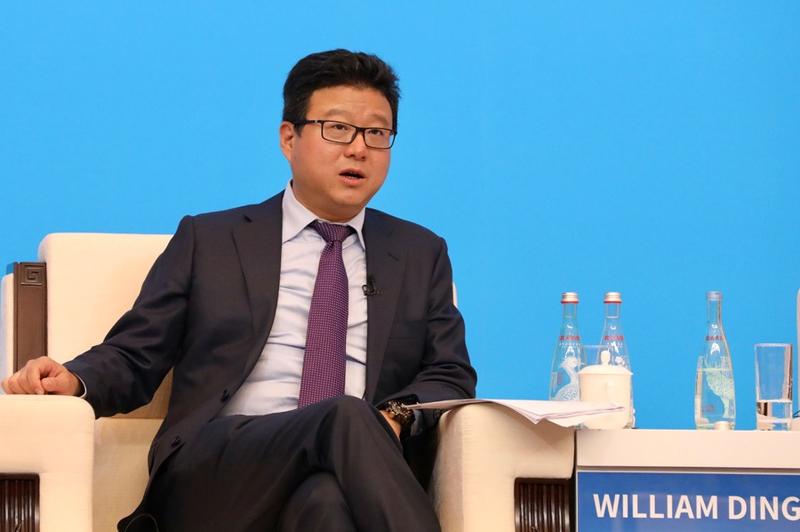
Chinese mainland’s tycoons are flooding Hong Kong’s exchange with US$20 billion worth of new listings.
Chinese mainland tech tycoons with companies trading in the city now have a combined net worth of US$182b, more than the 10 richest people in the HKSAR, according to the Bloomberg Billionaires Index
The latest to do so: William Ding of NetEase Inc and JD.com Inc’s Richard Liu, whose companies completed secondary listings there last month. They follow Jack Ma, whose Alibaba Group Holding Ltd stock issuance in November was the city’s largest since 2010.
Together, the three moguls’ firms have raised US$20 billion from share sales in the special administrative region, and that may be just the start of a new wave of listings by mainlanders.
“Chinese billionaires’ tech companies are helping the capital market in Hong Kong for a pivotal change and secure its Asia financial hub status,” said Edward Au, managing director of the southern region at Deloitte China. “The city’s stock exchange is also trying to make it a more appealing destination for new-economy companies.”
Chinese mainland tech tycoons with companies trading in the city now have a combined net worth of US$182 billion, more than the 10 richest people in the Hong Kong Special Administrative Region, according to the Bloomberg Billionaires Index. For them, Hong Kong is becoming increasingly appealing as Chinese mainland companies listed in the US face growing scrutiny and potential delistings following an accounting scandal at Luckin Coffee Inc and mounting tensions between the world’s two largest economies.
ALSO READ: HKEX chief: Stock Connects to widen investment options
 In this Nov 5, 2018 photo, William Ding, chairman and CEO of NetEase, attends the parallel session on trade and opening of Hongqiao International Economic and Trade Forum in Shanghai. (Zhu Xingxin / chinadaily.com.cn)
In this Nov 5, 2018 photo, William Ding, chairman and CEO of NetEase, attends the parallel session on trade and opening of Hongqiao International Economic and Trade Forum in Shanghai. (Zhu Xingxin / chinadaily.com.cn)
JD.com and NetEase have raised a combined US$7 billion with their secondary listings last month -- almost two-thirds of the total for Hong Kong in the first half of the year, according to data compiled by Bloomberg. Deloitte expects that as many as six Chinese mainland companies currently traded in the US will choose the city for a second listing by year-end. Robin Li’s Baidu Inc is among those weighing that option.
The city eased listing rules in 2018 to attract companies such as smartphone maker Xiaomi Corp and Meituan Dianping, China’s largest on-demand food delivery service. The move could eventually reshape the composition of the benchmark Hang Seng Index, according to Deloitte’s Au. In May, the index manager announced new criteria to allow companies such as Alibaba to be included in the gauge.
“The influx of these companies will greatly increase the representation of new-economy companies in Hong Kong, adding vibrancy and diversity to the market,” said Louis Lau, partner at KPMG China’s capital markets advisory group. “The continued listing of mega-sized Chinese firms also reinforces Hong Kong’s position as Asia’s financial hub.”


